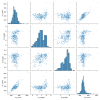We've had an excellent week of progress on the estimator - thanks to everyone on site for the great hospitality!
Status of things as we go
1. The estimator is OFF. We set the damping of M1 Yaw back to -0.5.
2 There are new YAW estimator blends in the SR3 model. These were put into foton with autoquack. The foton file in userapps was committed to the SVN
3. We updated the safe.snap SDF file with a decent version of the OFF estimator. We HAVE NOT updated the observing.snap file. At this point, all the estimator settings should be the same in safe and observing. (I'm not sure how to update the observing.snap file)
4. All the work on the estimator design is all committed to the {SUS_SVN}/sus/trunk/HLTS/Common/FilterDesign/Estimator/
-- some detailed notes on the blend design and svn commits follow --
Design new blend filters, load them into the model, commit the updated foton file
seems like a 2% error in the peak finding makes a bunch of noise in the estimator with the agressive blend, and is not a reasonable error (judgement call by Brian and Edgard)
>> print -dpng fig_2pcnt_error.png
>> print -dpng fig_2pcnt_error_result.png
Check noise again with 2% error in model/actual using the robust blend (EB blend) - we see the peaks are not any better.
I can't get a broad notch for notch 3 without causing the OSEM filter to be larger than 1. Issue seems to be the freq of the notches going past 60 deg. Could be tuned further.
Instead - use a simple notch. This means we'll need to be quite accurate with the 3 peak - probably withing 0.5% of the actual frequency
figures
gain error - no performance hit
2% freq error - clear perf hit
1% freq error - acceptable perf hit - top mode clearly worse, but only a little
0.5% freq error - tiny perf hit at top mode only
print -dpng fig_perf1_gainerror.png
>> print -dpng fig_perf2_0p5freqerror.png
>> print -dpng fig_perf3_1p0freqerror.png
>> print -dpng fig_perf4_perfectmatch.png
turn the script into a blend design script - Estimator_blend_doublenotch_SR3yaw.m
update the yaw frequencies to 1.016, 2.297, 3.385
can we use autoquack? - yes!
Real foton file is: /opt/rtcds/userapps/release/sus/h1/filterfiles/H1SUSSR3.txt
(make a backup copy): /opt/rtcds/userapps/release/sus/h1/filterfiles$ cp H1SUSSR3.txt H1SUSSR3backup.txt
the file make_SR3_yaw_blend.m uses autoquack to put the new filters into the SR3 foton file.
(log notes)
please review the recent foton -c log file at
/opt/rtcds/lho/h1/log/h1sussr3/autoquack_foton_log_recent.log
Checking foton file to see if filters got implemented correctly
BAD - Filter SR3_M1_YAW_EST_MEAS_BP has issues in sect. 1 : DBL_notch
at least one filter got messed up, please follow up...
Autoquack process complete
initial foton call succeeded
foton file ready for updating
starting foton cleanup process
final foton call succeeded
log file updated
please review the recent foton -c log file at
/opt/rtcds/lho/h1/log/h1sussr3/autoquack_foton_log_recent.log
Checking foton file to see if filters got implemented correctly
BAD - Filter SR3_M1_YAW_EST_MODL_BP has issues in sect. 1 : DBL_notch
at least one filter got messed up, please follow up...
Autoquack process complete
>>
Check the foton file - it looks good - I checked the TFs by eye, and they look correct. the matlab error checker is irritated, but the matlab plots it makes look fine. I think it's OK.
Do a diff on the updated file and my backup - the only diffs I see are the new lines I added (that's good)
save the foton file, delete my backup.
press 'coef load' to get the new filters
(the CFC light goes green)
commit the updated foton file in userapps R31301
Save the work in the estimator folder
Estimator$ svn1.6 add fig*
A (bin) fig_2pcnt_error.png
A (bin) fig_2pcnt_error_result_EBblend.png
A (bin) fig_2pcnt_error_result.png
A (bin) fig_blend.png
A (bin) fig_perf1_gainerror.png
A (bin) fig_perf2_0p5freqerror.png
A (bin) fig_perf3_1p0freqerror.png
A (bin) fig_perf4_perfectmatch.png
$ svn1.6 add Estimator_blend_doublenotch_SR3yaw.m make_SR3_yaw_blend.m
A Estimator_blend_doublenotch_SR3yaw.m
A make_SR3_yaw_blend.m
committed in R12257
Set the model to a good state:
final switch = OFF.
gain of the normal yaw damping set back to -0.5
OSEM_Damper = populated, but off (in=off, out=off, gain=0)
Estim_Damper = populated, but off (in=off, out=off, gain=0)
OSEM bandpass = populated and set to running state (on, gain=1)
MODEM bandpass = populated and set to running state (on, gain=1)
accept SDF changes in H1:SUS-SR3_M1_
YAW_EST_MODL_BP
YAW_EST_OSEM_BP
YAW_DAMP_EST
YAW_DAMP_OSEM
save this to the safe file - I have not changed the observing file!
the SDF shows 0 differences
notes on Diff of foton file:
brian.lantz@cdsws44:/opt/rtcds/userapps/release/sus/h1/filterfiles$ diff H1SUSSR3.txt H1SUSSR3backup.txt
1025,1030d1024
< # DESIGN SR3_M1_YAW_EST_MEAS_BP 0 sos(0.00026333867650529759, [0.99999999999999867; 0; -0.9999616512111712; 0; -1.999953052714962; \
< # 0.99995343154104388; -1.9997062783494941; 0.99970796324744837; -1.9998957078482871; \
< # 0.99989686159668212; -1.9999090565491939; 0.99990984807473893; -1.9999426937932141; \
< # 0.99994346902553977; -1.9999108726927539; 0.99991163318180731; -1.9999774146135141; \
< # 0.99997744772231478; -1.9999375279667919; 0.99993768590749621; -1.999963134023643; \
< # 0.99996328560740799; -1.9999399837273171; 0.9999401295235868])
1032,1037d1025
< SR3_M1_YAW_EST_MEAS_BP 0 21 6 0 0 DBL_notch 2.633386765052975870236851e-04 -0.9999616512111712 0.0000000000000000 0.9999999999999987 0.0000000000000000
< -1.9997062783494941 0.9997079632474484 -1.9999530527149620 0.9999534315410439
< -1.9999090565491939 0.9999098480747389 -1.9998957078482871 0.9998968615966821
< -1.9999108726927539 0.9999116331818073 -1.9999426937932141 0.9999434690255398
< -1.9999375279667919 0.9999376859074962 -1.9999774146135141 0.9999774477223148
< -1.9999399837273171 0.9999401295235868 -1.9999631340236430 0.9999632856074080
1042,1047d1029
< # DESIGN SR3_M1_YAW_EST_MODL_BP 0 sos(0.99973666135688777, [-1.000000000000002; 0; -0.9999616512111712; 0; -1.999965862142562; \
< # 0.99996754725922932; -1.9997062783494941; 0.99970796324744837; -1.9999754834715859; \
< # 0.99997627502341802; -1.9999090565491939; 0.99990984807473893; -1.999975984305477; \
< # 0.99997674481928778; -1.9999108726927539; 0.99991163318180731; -1.9999871245769849; \
< # 0.99998728252160574; -1.9999375279667919; 0.99993768590749621; -1.9999876354434321; \
< # 0.99998778124317389; -1.9999399837273171; 0.9999401295235868])
1049,1054d1030
< SR3_M1_YAW_EST_MODL_BP 0 21 6 0 0 DBL_notch 9.997366613568877680151559e-01 -0.9999616512111712 0.0000000000000000 -1.0000000000000020 0.0000000000000000
< -1.9997062783494941 0.9997079632474484 -1.9999658621425620 0.9999675472592293
< -1.9999090565491939 0.9999098480747389 -1.9999754834715859 0.9999762750234180
< -1.9999108726927539 0.9999116331818073 -1.9999759843054770 0.9999767448192878
< -1.9999375279667919 0.9999376859074962 -1.9999871245769849 0.9999872825216057
< -1.9999399837273171 0.9999401295235868 -1.9999876354434321 0.9999877812431739



















































